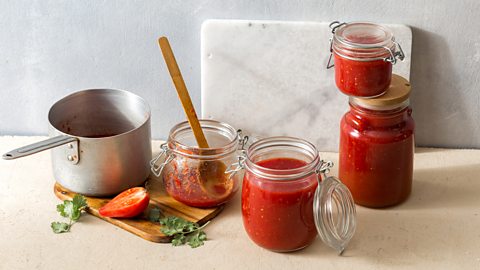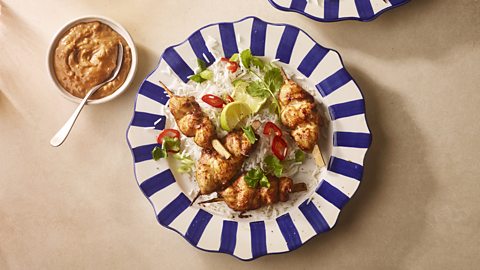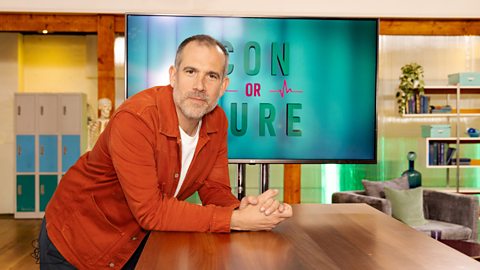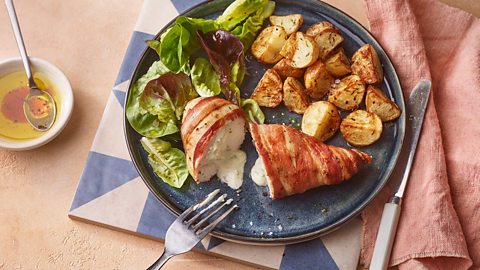Do any foods burn fat?
All over social media, people are posting about foods that can cause our body to ‘burn fat’. But is any of it true?
By Lauren Potts
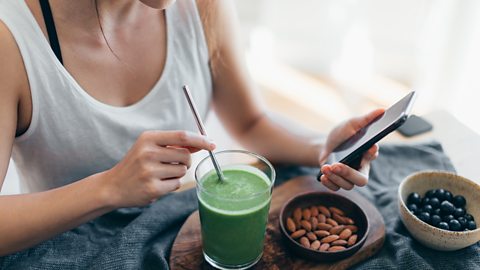
“Want to lose 10lbs of fat in three days? Take a glass of cold water, add a spoonful of instant coffee, a splash of olive oil and a spoon of chopped onion. Drink this first thing in the morning… and don’t believe everything you see on TikTok.”
This is the sensible and, some might say, obvious, advice of a content creator whose video had over 15,000 likes on social media. But among the comments applauding what many recognised as a spoof on a trend were regrettable confessions (“I ACTUALLY DRANK IT”) and even seemingly earnest questions like, “would decaf be OK?”.
Welcome to the world of social media, where people are so keen for a quick fat-loss fix they’d consider drinking onion for breakfast.
Can foods burn fat?
TikTok alone has seen 28.8 million posts about so-called fat-burning foods, while ‘belly fat burning foods’ is an even more popular topic, having racked up 71.7 million videos.
According to a study published in 2023, the widespread presence of fat-burning content on the platform is so huge that data suggests videos relating to the topic have been collectively viewed billions of times.
But the term ‘fat-burning food’ isn’t just problematic – it makes no reasonable sense, according to registered dietitian and British Dietetic Association (BDA) spokesperson, Aisling Pigott.
Ginger, apple and fennel shots
Ginger shots aren’t a miracle weight loss ingredient but they will provide a zingy start to your day
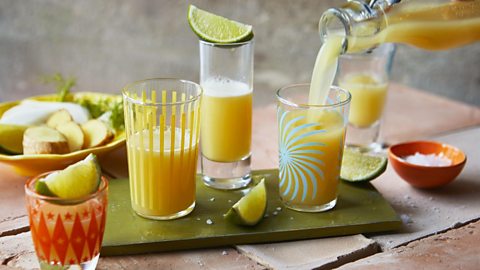
When social media creators claim a specific food or product is fat-burning, they’re implying that it uses up extra calories to deplete fat stores. From a metabolic perspective, ‘fat-burning’ simply means converting fat into energy, which is what our bodies are doing most of the time, she explains.
Semantics aside, it remains that social media is full of videos and discussions about ingredients that are guaranteed to help people lose weight.
One recipe for ‘fat-burning coffee’ recommends stirring in powdered turmeric, cayenne and ginger. Despite this questionable recipe being a probable shortcut to heartburn, the video has 1.7 million views and umpteen enthusiastic comments from people who can’t wait to try it. Is it worth a go?
“If you look at all of those individual ingredients, you will find studies that show they have some impact on either thermogenesis (the amount of heat the body creates) or calorie expenditure,” says Pigot.
Sure enough, one study on mice from 2009 found there was a ‘possibility’ that spices – specifically capsaicin, which is derived from chilli, and compounds derived from mustard and cinnamon – enhance thermogenesis, which according to a 2010 study can have a positive effect on weight loss.
But as to whether a sprinkle of spice in your morning coffee is going to make you burn fat, that’s a reach – to put it mildly.
“It’s not going to be substantial or measurable or actually work in real life,” says Pigott, who lectures at Cardiff Metropolitan University. “It might perhaps increase your overall expenditure by one or two calories but that’s not enough to result in any weight loss.”
Caffeine boost
The element of caffeine is interesting, Pigott adds. It often gets promoted as ‘fat-burning’ and one 2005 study suggested caffeine reduced body fat in rats. She cautioned that there’s been no evidence to show it can be replicated in humans though, because we don’t share the same metabolic pathways as rodents.
That said, there is one potential benefit.
“We know that caffeine improves your performance, say, in the gym. So, working out after consuming it could mean that you are potentially burning more energy, building more muscle and losing your fat stores,” she says.
“But while caffeine might have a role in performance, it’s not going to make you lose weight by itself.”
Dalgona coffee
If you want a coffee with a difference, try this Korean drink
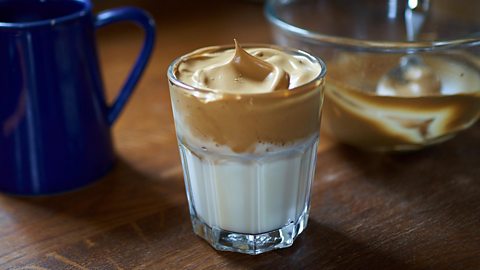
There are other caffeine-related claims to be cautious about on social media too, like those suggesting you drink five cups of green tea a day.
One Instagrammer claimed it would help burn fat and was “nature’s Ozempic” because it helps “produce more GLP-1, which is found in Ozempic,” a much-talked about brand of diabetes medication which has become popular for weight loss.
Pigott highlights that one 2015 study in mice found coffee polyphenols increased postprandial release of active glucagon-like peptides – the hormone that plays a role in appetite control and insulin release. But the same effect hasn’t been proved in humans and GLP-1 levels are “very much” dictated by genetics, she adds.
Myth-busting
It’s all just one example of social media creators using scientific language to sound bona fide and gain traction. And it often works: Pigott points out we have a human tendency to believe people who sound smart or use big words.
Instead, she suggests people heed the evidence and official government advice around weight loss.
“The problem is not that the official advice doesn’t work, it’s that we struggle to follow it. Instead, we look for oversimplified answers or one-trick wonders. So when somebody comes out with a magic trick, we cling on to that and think it’s the answer.
“[It] might be part of the answer. Somebody may find that having a cup of coffee before the gym is something that helps their performance – but it doesn’t mean that having five cups of coffee a day is going to make them slim.”
In fact, she points out, one study in 2020 found high levels of caffeine is likely to disrupt sleep, which is linked with weight gain.
Adding butter or lemon to your cup of Joe – both popular suggestions on social media – is not going to help either, adds Pigott.
Neither does she believe in social media’s ‘fat-burning berries’. “They’re a really good source of vitamin C and fibre. But they don’t make you skinny. They’re just blueberries.”
Healthy apple crumble
This berry and apple crumble is a lower-fat option compared to other comforting puds
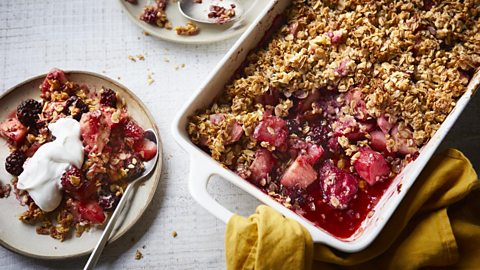
Apple cider vinegar – often sold in supplement form on social media – is another fat-burning myth.
The idea that vinegar can aid weight loss has been around at least since the 1800s, says Pigott, and while there’s some research to suggest it might have benefits for glucose metabolism and weight control, it’s never been replicated in large-scale, high-quality studies.
“You will get much more benefit from looking at whether you’re getting enough fibre and protein, and eating plenty of fruit and vegetables,” she adds.
Follow the science
It’s the tried-and-tested advice that Pigott repeatedly comes back to.
Rather than following the advice of an unqualified TikToker who claims drinking a bottle of water full of chia seeds will make you burn fat (6.6 million views and counting, if you were wondering), Pigott recommends sprinkling those same seeds on some porridge, which has more fibre and will satiate the appetite, perhaps therefore supporting weight loss.
There is no magic trick – it’s about eating and exercising sensibly.
Mango lassi chia pudding
They may not burn fat, but chia seeds are full of fibre and can add a distinctive texture to smoothies and puddings
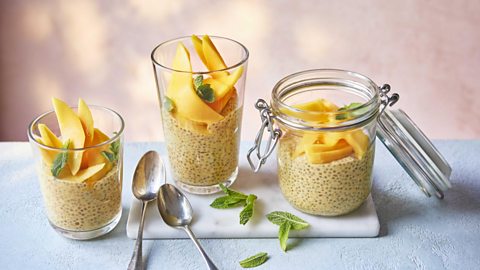
“At the end of the day, the amount of energy we’re consuming in relation to what we’re expending – and our individual genetics and makeup – is what will define whether or not we’re changing our body composition,” she says.
“To achieve [that], you need to have all of the right ingredients in your diet, like following some of the key messages of the Mediterranean diet and the UK guidance around what a healthy balanced diet should look like.”
She recommends hitting 30g of fibre a day, eating protein at every meal and ensuring a daily mix of fruit and vegetables. Both the BDA and the government also highlight choosing wholegrain carbohydrates and making sensible dairy choices.
As for social media, remember that creators know what will get hits and likes. Always question their claims, says Pigott.
“The information is going to appear sexy to draw you in. [Ask yourself] who’s giving you the information and whether it sounds too good to be true. If so, it probably is.
“It’s the Wild West out there – try to step back a bit from social media and instead look at reliable, trustworthy sources of information.”
Originally published March 2025
Want more? Visit BBC Food on Instagram, Facebook and Pinterest. Want to watch the latest Food TV programmes? Visit BBC iPlayer.
